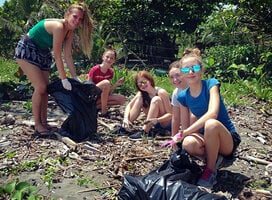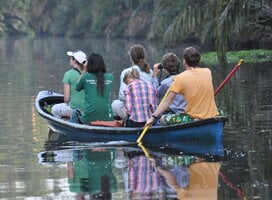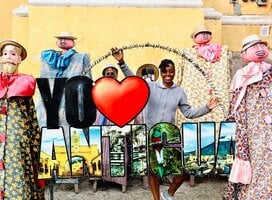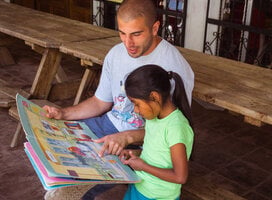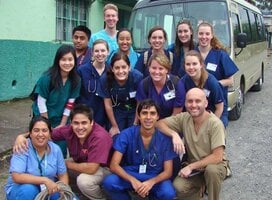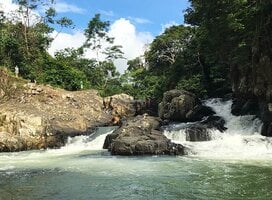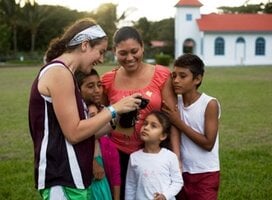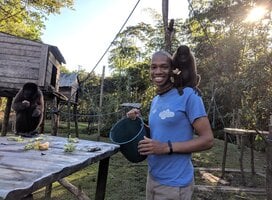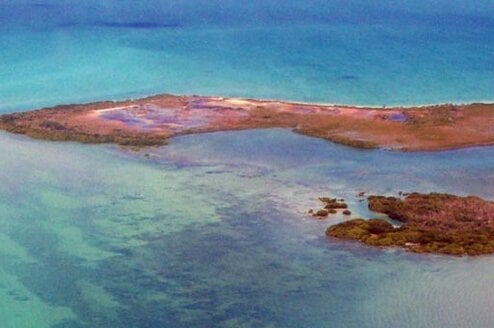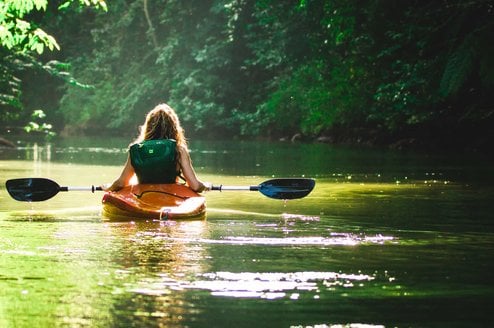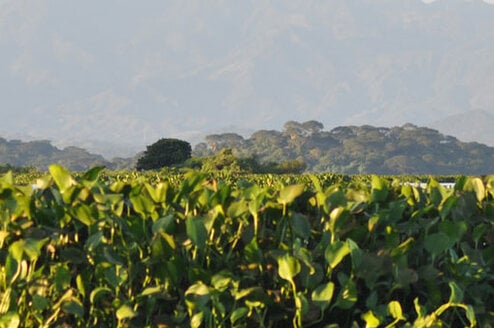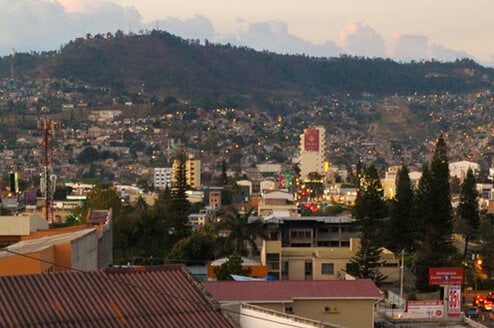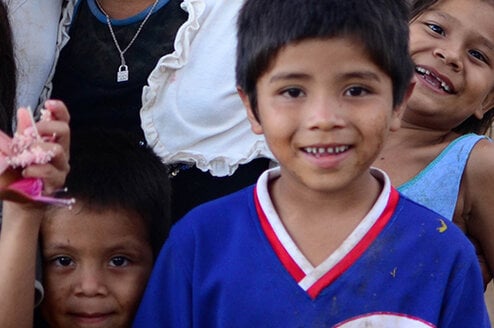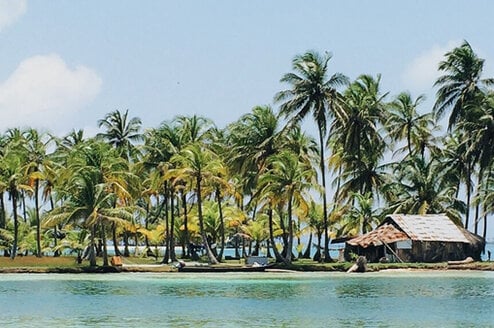Volunteer Programs in Central America
In comparison to many other Western economies, Central America (comprising of Belize, Costa Rica, El Salvador, Honduras, Guatemala, Nicaragua and Panama), is still a largely impoverished region. With recent civil wars, continuing political instabilities, crippling foreign debt and much lower standards of education, conservation, social and medical care than many developed economies, much of the wealth relies on either profit from tourism or the migration of multi-nationals to cheaper Central American locations, (such as Intel Corporation, Microsoft, HP, Proctor & Gamble and many more, to Costa Rica).
Because of these economic and social factors there is a wealth of areas for volunteers to get involved in. These run the gamut from working with orphaned children, helping improve land and sea conservation efforts, to helping construct better community facilities.
In fact, any area of volunteering you might be interested in, you can probably find in Central America!
Conservation
Many volunteers head to the Caribbean coast of Costa Rica, to help protect the sea turtles. The turtles are in danger because of egg and turtle poaching, fishing net use and pollution. The volunteers work to educate and provide the local people with an alternate source of income, aside from poaching. Volunteers also work in egg hatcheries and turtle rescue and rehabilitation centres.
There are many organisations offering turtle protection programs, and this is one of the most popular conservation projects for volunteers, in Central America.
Programs run year round, and your working schedule will vary. For example, you might be patrolling the beaches at night looking for adult nesting turtles, manning the hatchery or taking care of sick turtles. You will be working irregular hours and no 2 days are ever the same!
Child Welfare/Education
There are opportunities to work with disadvantaged children in many Central American countries, and need for volunteers is especially high in the poorer Central American countries of Guatemala, Honduras and Nicaragua. Your duties could include volunteering in an orphanage and organizing the children’s recreational and educational activities, or assisting with English classes at local schools.
For the many orphans and abandoned children in Central America life on the streets can be dangerous, miserable and short-lived. Even if they are lucky enough to be taken into a refuge, the often limited resources and staffing means they can still lack basic childhood rights, like a good education and being shown affection. You can make a difference!
And for many other children in community schools, the chance to be taught by a native speaker will really motivate them to improve their English, and therefore boost their future work prospects. So, you could also help shape a child’s future by teaching!
Your working day may vary, depending on which type of organisation (school, orphanage or community centre) and what your role is; but might typically be from 8.30am-3pm, Monday to Friday (for example) in a school.
Community Development
Volunteers can work for a variety of programs, such as in construction and renovation; to help with home-building and school and orphanage renovation. These programs help to (literally!) re-build and empower local communities in impoverished areas. You don’t need previous construction experience but you do need to be fit, be willing to work hard, and to work sometimes long and irregular hours. It is possible to undertake community development projects in all the countries, especially the poorer ones.
Volunteering Tips
Be prepared to work hard: You are not going for a relaxing holiday; you are going to help local communities through your hard work, and to enrich your life resume in the process. So although you should have an amazing experience, you must be prepared to suck it up and sometimes forgo luxuries! However, it is possible to survive without all your beauty products and/or the ability to check Facebook every hour! And you probably will be having too much fun to do that anyway!
Be aware of the specific entry requirements of your chosen country: Requirements and length of stay varies between country of origin and the country you are entering. To avoid drama or being fiddled out of money (especially at land borders) know before you go! Specific information is available in the ‘Health & Safety’ section of the relevant country, via the Lonely Planet’s Central America section. As mentioned previously, work visas are harder to obtain. It’s worth checking with your NGO whether by working as an intern with them you might eliminate the need for a work visa.
Money: Either carry local currency with you before entering the country or know the approximate exchange rate (to avoid said ‘fiddling’). And/or carry US dollars, as you can often use these as currency. Lastly, don’t rely on conveniently located or even working ATMs (as the author found out to her detriment, late one night, in a particularly sketchy area of Honduras!)
Insurance: Ensure you have adequate insurance to cover medical expenses and personal items etc... If you have a big medical emergency you will want the best treatment, which might include either a private hospital or flying home (depending on your condition and the hospital conditions in the country you are in). Additionally, due to high poverty levels in much of Central America, petty theft is the most common form of ‘tourist’ crime. So make sure you’re insured to cover against all eventualities!
Learn some lingo: You will have a much richer, much less frustrating experience if you can speak a little of the language. Although many volunteer organisations will tell you that you don’t need to speak Spanish to work for them, it will much improve your experience with the locals and help during any time that you’re away from your organisation; because you will be able to communicate, understand what’s being said about and to you, and get what you want!
How to Save Money Whilst Volunteering
Food/board: Chose an organisation where you can work for food or board. Or try to save money by staying with a local family in a home stay. Stay somewhere with kitchen facilities so you can cook for yourself. Buy fresh, inexpensive produce from local markets. If eating out, chose local eateries (usually a street or two back from the main plazas); they should be full of locals, and probably have non-English menus. Or buy snacks from street vendors.
Travel: You cannot say you’ve experienced Central America if you haven’t travelled on a ‘chicken’ bus (old, North American school buses, which ferry locals between destinations). Do not expect: your personal space, aircon (unless you count being blasted in the face with warm, dusty, roadside air), to ever stop fearing for your life during your white-knuckle journey, or for passenger safety to be (even vaguely) valued. But...if you can overlook all of this, you will have a truly authentic, very economic, travel experience!
Haggle: Don’t be afraid to haggle for everything that doesn’t have a price sticker! Haggle for accommodation (especially during ‘off-peak’ seasons), tourist activities and market goods. And anything else you can get away with! Be polite and do it with a smile and you’re more likely to get a yes!
Health and Safety of Volunteers
Vaccinations: Visit your doctor or a travel clinic for vaccinations at least four to eight weeks before your trip. Because Central America countries have different risks, as well as within various regions of each country, requirements vary. A country by country guide can be found on the MD Travel health website.
Dangers and annoyances: The main problem that tourists face is from petty theft/pick pocketing and scams.
Be careful not to flash cash or expensive equipment (such as digital cameras) around too much.
Consider having a ‘dummy’ wallet with some, but not all, of your cash to give a potential mugger.
Split up valuables (plus cash/credit cards, etc.) between locations in your luggage/ on your person. And don’t trust hotel staff or hotel safes with your goods; especially credit cards.
Be aware of your surroundings and the people around you, especially if you venture into isolated locations. Keep your eyes and ears open.
Regarding scams, if something seems too good to be true then it probably is! Always clarify ‘deals’, haggle, and speak to other travellers to swap tips and warnings. The author would like to advise you (from personal experience) to be aware of local police corruption. Meaning: it’s not always in their best (financial) interests to tell you the truth about muggings in nearby, isolated spots, for example. You are better off listening to your fellow travellers.
Contributed by Lynette Moore
